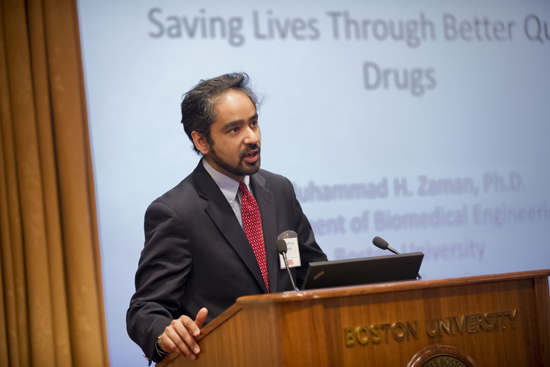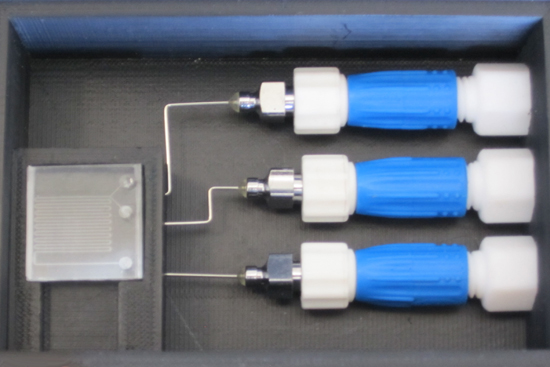ENG Counterfeit Drug Screener Promises to Save Lives
Device for use in developing countries wins national award

Muhammad Zaman and graduate students are developing a device to detect counterfeit and substandard medicines. Photo by Kalman Zabarsky
Get ready for a surprising number: 50 percent of medicines distributed in developing countries are either counterfeit or significantly substandard. Those fake and tainted products are responsible for countless medical complications and deaths.
Muhammad Zaman, a College of Engineering associate professor of biomedical engineering, postdoc Darash Desai (ENG’12,’12), and graduate student and ENG research fellow Andrea Fernandes (SPH’10, GSM’16) are doing something about it. They have developed PharmaCheck, a fast, portable, user-friendly detector for screening counterfeit and substandard medicines. To test a medication, a user places a pill in a small testing box that instantly reports the amount of active ingredients found in the pill.
The device’s clear potential to dramatically improve health outcomes in resource-limited countries has attracted significant funding over the past year, and now its developers have received one of nine $18,500 Entrepreneurial Team (E-Team) Stage Two grants from the National Collegiate Inventors and Innovators Alliance (NCIIA), which promotes technology innovation and entrepreneurship in higher education. The grant package includes an intensive workshop to help the team further develop its business strategy, followed by six monthly sessions of business coaching—and eligibility for up to $50,000 in additional funding.
“We are thrilled to receive the funding from NCIIA, which will enable our students to further develop PharmaCheck and conduct field and market research that will be absolutely critical for its long-term success and impact,” Zaman says.
Funding from the NCIIA and other agencies will support the team in completing its first prototype, performing hands-on testing in the field in Ghana, and analyzing the supply chain in developing countries to pinpoint where poor-quality medicines are introduced. The goal is to enable users of the device, from pharmacists to regulatory authorities, to control the quality of medicine delivered to patients.

“Our hope is that PharmaCheck will help support and increase medicine quality testing around the world and ensure that medicines intended to save lives do just that,” says Desai. “The opportunity to work on everything from conceptual and technical development to business strategy and scale-up has been an invaluable learning experience that’s surprisingly uncommon in graduate work.”
Focused on marketing and funding for PharmaCheck, Fernandes aims to ensure that the device reaches the people it’s intended to serve.
“All of the market research data that we’ve collected indicates that there is a real need and willingness to pay for this capability,” she says. “The challenge is how to create a business model around this technology to sustain economies of scale and create impact.”
Through grants and intensive training, the NCIIA E-Team Program supports the next generation of innovators striving to improve the lives of underserved populations in developing countries and meet critical social and environmental needs in the United States. Since NCIIA’s founding in 1995, more than 180 companies have been launched as a result of early-stage support from NCIIA grants and training.
More information about PharmaCheck, including a video presentation, is available here.
Mark Dwortzan can be reached at dwortzan@bu.edu.
Comments & Discussion
Boston University moderates comments to facilitate an informed, substantive, civil conversation. Abusive, profane, self-promotional, misleading, incoherent or off-topic comments will be rejected. Moderators are staffed during regular business hours (EST) and can only accept comments written in English. Statistics or facts must include a citation or a link to the citation.